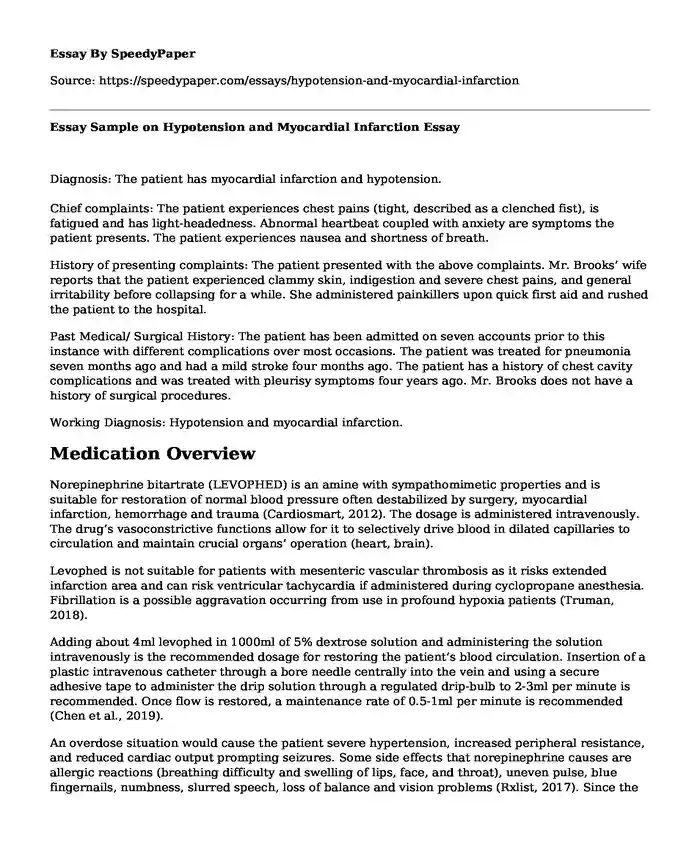Diagnosis: The patient has myocardial infarction and hypotension.
Chief complaints: The patient experiences chest pains (tight, described as a clenched fist), is fatigued and has light-headedness. Abnormal heartbeat coupled with anxiety are symptoms the patient presents. The patient experiences nausea and shortness of breath.
History of presenting complaints: The patient presented with the above complaints. Mr. Brooks’ wife reports that the patient experienced clammy skin, indigestion and severe chest pains, and general irritability before collapsing for a while. She administered painkillers upon quick first aid and rushed the patient to the hospital.
Past Medical/ Surgical History: The patient has been admitted on seven accounts prior to this instance with different complications over most occasions. The patient was treated for pneumonia seven months ago and had a mild stroke four months ago. The patient has a history of chest cavity complications and was treated with pleurisy symptoms four years ago. Mr. Brooks does not have a history of surgical procedures.
Working Diagnosis: Hypotension and myocardial infarction.
Medication Overview
Norepinephrine bitartrate (LEVOPHED) is an amine with sympathomimetic properties and is suitable for restoration of normal blood pressure often destabilized by surgery, myocardial infarction, hemorrhage and trauma (Cardiosmart, 2012). The dosage is administered intravenously. The drug’s vasoconstrictive functions allow for it to selectively drive blood in dilated capillaries to circulation and maintain crucial organs’ operation (heart, brain).
Levophed is not suitable for patients with mesenteric vascular thrombosis as it risks extended infarction area and can risk ventricular tachycardia if administered during cyclopropane anesthesia. Fibrillation is a possible aggravation occurring from use in profound hypoxia patients (Truman, 2018).
Adding about 4ml levophed in 1000ml of 5% dextrose solution and administering the solution intravenously is the recommended dosage for restoring the patient’s blood circulation. Insertion of a plastic intravenous catheter through a bore needle centrally into the vein and using a secure adhesive tape to administer the drip solution through a regulated drip-bulb to 2-3ml per minute is recommended. Once flow is restored, a maintenance rate of 0.5-1ml per minute is recommended (Chen et al., 2019).
An overdose situation would cause the patient severe hypertension, increased peripheral resistance, and reduced cardiac output prompting seizures. Some side effects that norepinephrine causes are allergic reactions (breathing difficulty and swelling of lips, face, and throat), uneven pulse, blue fingernails, numbness, slurred speech, loss of balance and vision problems (Rxlist, 2017). Since the patient presents with hypotensive complaints and myocardial infarction, administration of an average dose of levophed suits the proper restoration of blood flow. Moreover, the patient has no history of hypoxia or mesenteric vascular thrombosis.
Nursing Implication
Nurses will ensure the the patient’s blood pressure and pulse is under continuous monitoring and management during treatment. Cardiac monitors should be employed during IV administration. Resuscitation equipment should be close during IV infusion. The IV line should not be mixed with other drugs. Infusion rate should maintain a systolic blood pressure of 80-100mmHg. The patient will be assessed frequently for any side-effects. Hourly monitoring of the IV is mandatory to check for skin necrosis.
Patient Education Plan
The information availed to the patient in the hospital website's library is intended to guide the patient into discerning the proper medication strategies based on the doctor's advice and referring from the library's guidelines. The basic and vital information about norepinephrine guides a patient through treatment such that instances of overdoses are mitigated, side effects are managed without adverse effects, and the handling of treatment is seamless.
References
Cardiosmart. (2012). norepinephrine. Cardiosmart.Org. https://www.cardiosmart.org/Healthwise/d003/23/d00323
Chen, A., Vogan, E., Foglio, J., Davis, R., Reddy, A. J., & Lam, S. W. (2019). Effect of detailed titration instructions on time to hemodynamic stability in ICU patients requiring norepinephrine. The Joint Commission Journal on Quality and Patient Safety, 45(9), 606-612. https://www.sciencedirect.com/science/article/pii/S1553725018304823
Rxlist. (2017). Levophed (Norepinephrine Bitartrate): Uses, Dosage, Side Effects, Interactions, Warning. RxList. https://www.rxlist.com/levophed-drug.htm
Truman. (2018). Norepinephrine |. Truman State University. http://shadwige.sites.truman.edu/cardiac-medications/hemodynamic-medications/norepinephrine/
Cite this page
Essay Sample on Hypotension and Myocardial Infarction. (2023, Oct 10). Retrieved from https://speedypaper.com/essays/hypotension-and-myocardial-infarction
Request Removal
If you are the original author of this essay and no longer wish to have it published on the SpeedyPaper website, please click below to request its removal:
- Essay Sample on a Practical Approach to Ethical Decisions in Clinical Medicine
- Essay Sample on Bill of Rights: Right to Privacy
- Generalized Anxiety Disorders. Essay Example
- Essay Sample on Reason for Restaurants to Change Their Menu
- Annotated Bibliography on Police Brutality: Setting the Agenda for Minority Health
- Paper on Navigating Neuropsychology: Ethics, Legal Challenges, and Clinical Insights in Traumatic Brain Injuries
- Paper Sample on Financial Factors Affecting Healthcare
Popular categories





